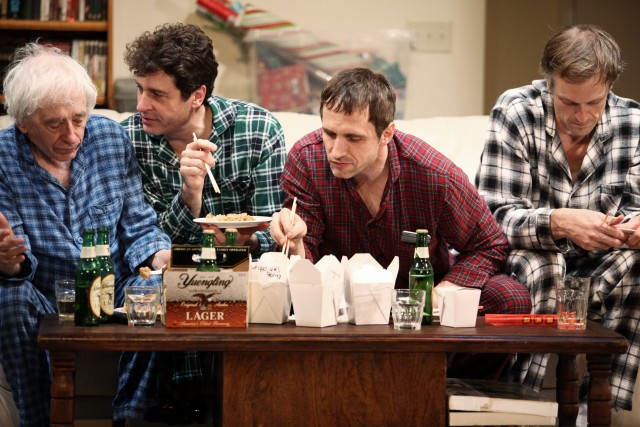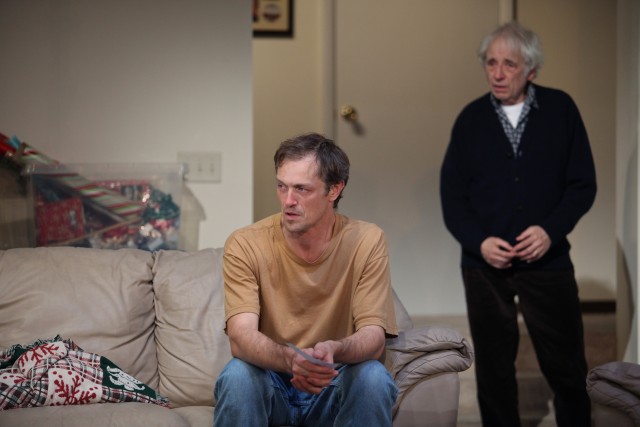
Ed (Austin Pendleton), Jake (Gary Wilmes), Drew (Pete Simpson), and Matt (James Stanley) enjoy some traditional Christmas Eve Chinese food in STRAIGHT WHITE MEN (photo by Julieta Cervantes)
Martinson Hall, the Public Theater
425 Lafayette St. at Astor P.
Through December 7, $35-$45
212-539-8500
www.publictheater.org
www.youngjeanlee.org
There’s nothing subtle about the work of Young Jean Lee, which includes the highly praised Untitled Feminist Show and We’re Gonna Die. In one of her earliest works, Songs of the Dragons Flying to Heaven, she examines her own Korean heritage with such characters as Korean 1, Korean 2, White Person 1, White Person 2, and Korean American. “You know what’s awesome?” White Person 2 says to White Person 1. “Being white.” To which White Person 1 says, “I guess I never thought of it. And when I do think of it I feel like an asshole.” In many ways, that exchange can be seen as the starting point for Lee’s latest work, Straight White Men, which opened last night at the Public Theater. As the audience enters Martinson Hall, they are bombarded by thumping, extremely sexually graphic hip-hop songs by black women, mixed DJ style by Chris Giarmo. The ninety-five-minute show, which is broken into three acts without intermission, is set in a typical Midwest living room on Christmas Eve. Gathering together are the widowed patriarch, Ed (Austin Pendleton), his stay-at-home oldest son, Matt (James Stanley), his recently divorced middle boy, financial whiz Jake (Gary Wilmes), and his youngest, Drew (Pete Simpson), a teacher and novelist. The three sons revert to juvenile action as they fight over the quality of the tree, needle each other with old stories from their childhood, drink eggnog, eat Chinese food, and play Privilege, an alternate version of Monopoly designed by their apparently radical dead mother. At one point, Jake lands on Excuses and draws a card that he reads out loud: “‘What I said wasn’t sexist / racist / homophobic because I was joking. Pay fifty dollars to the Lesbian and Gay Community Services Center.’” Social consciousness is central to the Nortons, so much so that Matt is living at home, taking care of his aging father, and working as a temp for a community organization, something that infuriates his brothers, who expect so much more from him. “Matt was always trying to save the world,” Ed says.

Attention is focused on the oldest son as Young Jean Lee play gets serious (photo by Julieta Cervantes)
For the first two acts, Lee is at the top of her estimable game, constructing, then deconstructing, this carefully built world of white people celebrating Christmas as she subtly takes on race, religion, social and environmental responsibility, “cowardly macho bullshit,” materialism, checkbook activism, and Broadway show tunes. (The boys’ rendition of “Oklahoma!” is a riot: “OOOO-klahoma / Where the wind comes sweepin’ down the pain / Where we sure look sweet, in white bed sheets / With our pointy masks upon our heads!”) The lighthearted patter and playful sibling rivalries play out as stereotypically as they can in a white family; Ed even sneaks white tube socks and candy canes into his sons’ Christmas stockings hanging on the mantel. Lee directs the show with a generous hand, allowing for broad comedy choreographed with panache by regular collaborator and fellow Guggenheim Fellow Faye Driscoll. Lee is also commenting on theater itself; in between acts, Public Theater personnel silently clean up the set with the lights on, emphasizing the fiction that is under way onstage. But the story takes a decidedly different turn in the third act as Ed, Jake, and Drew try to discover what happened to Matt’s long-gone ambitions. The last scenes feel overly workshopped, extended with role-playing and arguments that feel out of character with the world Lee has established to that point. It’s not merely the mean-spiritedness that’s confusing or that Lee’s usually penetrating insight is so uncomfortable as much as she has boiled the story down to a central issue that goes nowhere, even if that is her point. But that doesn’t take anything away from her outstanding cast. Wilmes (Chinglish, Red Light Winter) channels Otter from Animal House as Jake, who believes in tough love; Simpson is edgy and unpredictable as Drew; Stanley, evoking Peter Fonda, is calm and sensitive as the troubled Matt; and the ubiquitous Pendleton, a theater mainstay as writer, director, and actor ever since his portrayal of the tailor Motel Kamzoil in the original Broadway version of Fiddler on the Roof, is tender and gentle as the concerned father.